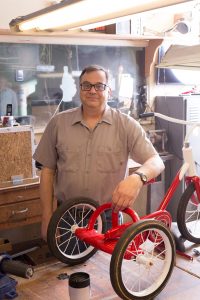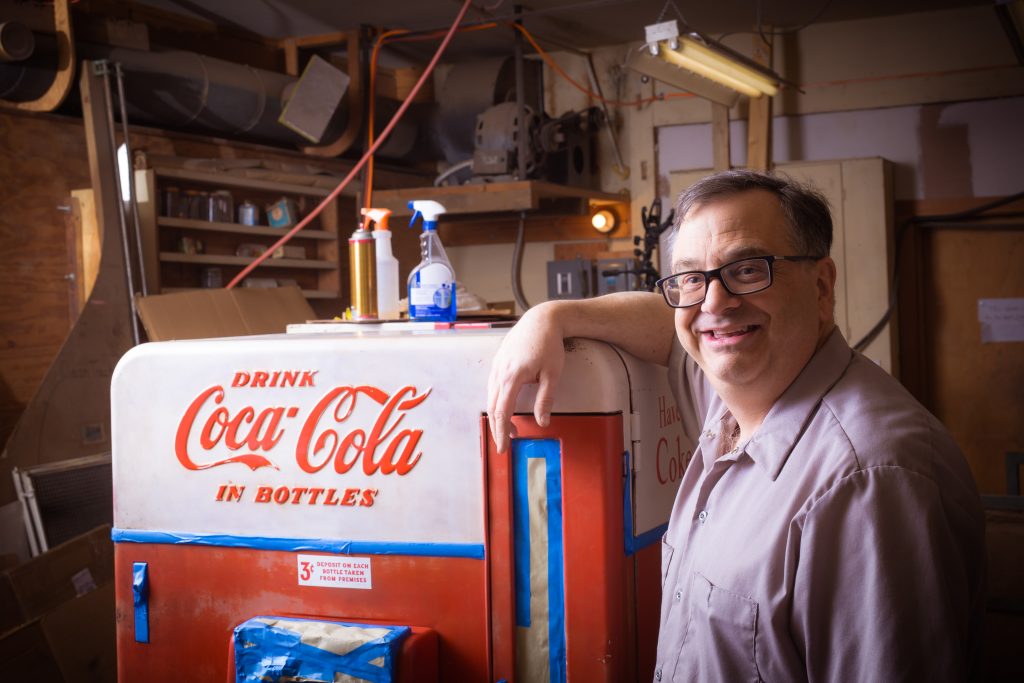Writer / Michelle Kaufman
Photographer / Brian Brosmer
 Eight-year-old Tim Showalter saw a bicycle in a neighbor’s trashcan and asked if he could have it. He got two broken bikes and combined them to make one, which he rode and eventually sold.
Eight-year-old Tim Showalter saw a bicycle in a neighbor’s trashcan and asked if he could have it. He got two broken bikes and combined them to make one, which he rode and eventually sold.
In middle school, he took a class called industrial arts and fell in love with woodworking and metalworking. At night, his father, a Beech Grove school system administrator, would go into the wood shop and build furniture and Christmas presents and fix things.
Today, Showalter’s career is based around restoring old bicycles and other items. He previously worked in Beech Grove schools doing education technology but got burned out and wanted to do something that he really enjoyed. Four years ago, a TV show called “American Restoration” was on the History Channel, and it inspired Showalter.
“I thought, ‘Wow, that guy [on TV] is making a living at restorations, maybe I could do that,’” he recalls. “I just kind of blindly cashed in my 401k and jumped into it not knowing what to do or how to run a business or anything like that. I started in my mom’s garage, and I put up a website right away.”
People began calling and emailing Showalter asking him to restore items, including an old friend who had light sconces that needed done for the outside of a building. He fiddled around with a paint gun and, after a couple tries, he got them right.
More people started calling, and Showalter began reading books and watching YouTube videos. He got better, and eventually the workload became more than he could handle on his own. He currently has around 45 jobs in the shop from the U.S. and Canada and three part-time employees.
“The Internet’s a wonderful thing, and it’s really helped my business,” Showalter says. “It got me known out there. I’m looking for more people who have skills to come and help because it’s just crazy how busy I am. I’m here about 10 hours a day, seven days a week just doing this, but I love it. I don’t get tired of it. Sometimes I’ll need a little break, but I just love doing it.”
Showalter heats up metal to bend and twist it and also recreates decals, logos and images as well as painting work. Everything is done in-house, and he searches the Internet, goes to swap meets and has friends on trash pickup who he buys parts from. If he absolutely can’t find a part, he’ll either make it or turn another item into what he needs. He recently restored a tricycle that looked like it had been hit by a car with no straight line on it.
“We totally restored it and it looked brand new when we were done,” Showalter says. “Everything was original except for the handlebar grips and pedals. The thing I like about toys built in the 50s and before is they’re all made of steel and metal. They’re almost indestructible. Today, you go buy a car and it’s all plastic for a little kid and several months later it’s out in the trash. This stuff, they’re survivors.”
Showalter says that every item is unique. He does plenty of tricycles, pedal cars, Coke machines and wagons. He recently restored a dented 1940s arc welder as a surprise Valentine’s Day gift for a woman’s husband. Other customers of Showalter’s have cried when they saw the restored item.
“That makes you feel really good that you know you did something right,” he says. “That’s my goal, I really want to get it right every single time. I ask a lot of questions and do a lot of research and make sure that everything is right, down to the tires and the hubcaps on the little cars and everything.
“Most of the time, they’re reliving a memory from when they were kids and if it’s right, boy that will take them right back to when they were a little kid, and you can see it in their face and their eyes just light up,” Showalter adds. “A lot of people get things restored to hand down to their grandchildren, so they want to pass that memory onto their children and grandchildren.”
Showalter’s newest offering is powder paint, a process where paint is electrically charged and adhered to metal. After sticking it in an oven to bake, the powder paint turns solid and durable.
“I just built a little oven, and I’m starting to do that powder coating now, so that’s really a big move for us to offer that,” Showalter says. “I’ve always had kind of a wild imagination so I just try to figure out how to do things.”
Tires are the biggest challenge Showalter faces. Hoosierboy Restorations finishes one to two items per week due to how time consuming each item is. One tricycle can take 30 to 40 hours to restore.
“It’s been a real learning curve,” Showalter says. “But I don’t want anything to go out that I would be embarrassed by or would want to see come back, so I make sure everything is done right when it leaves here. I want it done right.”
For more info or to see examples of Showalter’s work, visit HoosierboyRestorations.com.






